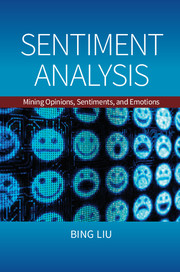Book contents
- Frontmatter
- Contents
- Preface
- Acknowledgments
- 1 Introduction
- 2 The Problem of Sentiment Analysis
- 3 Document Sentiment Classification
- 4 Sentence Subjectivity and Sentiment Classification
- 5 Aspect Sentiment Classification
- 6 Aspect and Entity Extraction
- 7 Sentiment Lexicon Generation
- 8 Analysis of Comparative Opinions
- 9 Opinion Summarization and Search
- 10 Analysis of Debates and Comments
- 11 Mining Intentions
- 12 Detecting Fake or Deceptive Opinions
- 13 Quality of Reviews
- 14 Conclusions
- Appendix
- Bibliography
- Index
11 - Mining Intentions
Published online by Cambridge University Press: 05 June 2015
- Frontmatter
- Contents
- Preface
- Acknowledgments
- 1 Introduction
- 2 The Problem of Sentiment Analysis
- 3 Document Sentiment Classification
- 4 Sentence Subjectivity and Sentiment Classification
- 5 Aspect Sentiment Classification
- 6 Aspect and Entity Extraction
- 7 Sentiment Lexicon Generation
- 8 Analysis of Comparative Opinions
- 9 Opinion Summarization and Search
- 10 Analysis of Debates and Comments
- 11 Mining Intentions
- 12 Detecting Fake or Deceptive Opinions
- 13 Quality of Reviews
- 14 Conclusions
- Appendix
- Bibliography
- Index
Summary
Before performing an action, we almost always have the intention to perform the action first. In many cases, we also talk about or write about our intentions. Although the concept of intention has been investigated in philosophy and psychology, researchers in these fields are usually not concerned with the language used to express intentions or how to infer intentions from written language computationally, which is our objective in this chapter. Studying intention computationally is just beginning, and our understanding of the problem is still limited.
Intention and sentiment are generally regarded as two different concepts. They are, however, closely related, which we will discuss in Section 11.1. Mining intentions also has many practical applications. For example, if we find that a large number of Twitter posts say something like “I am dying to see the Life of Pi,” we can predict that the movie is going to do well at the box office. If one wrote “I am looking for a car to replace my old Ford Focus, any suggestions?” the person clearly wants to buy a car and a car dealer can quickly recommend the person some new car models. If the dealer also has reviews of these cars, these reviews can be shown to this potential buyer in persuasion at the same time. Mining intention information is also useful to social media hosting sites, which often use their user-generated content (posts) for advertising. If user intentions can be recognized automatically, advertising can be made intention based and should therefore be much more targeted and effective. This chapter is organized as follows. Section 11.1 defines the intention mining problem. Section 11.2 studies an existing method for identifying intention posts in social media based on transfer learning. Section 11.3 suggests a simple method to mine fine-grained intentions of any kind in a massive scale from any social media site.
- Type
- Chapter
- Information
- Sentiment AnalysisMining Opinions, Sentiments, and Emotions, pp. 250 - 258Publisher: Cambridge University PressPrint publication year: 2015
- 1
- Cited by



